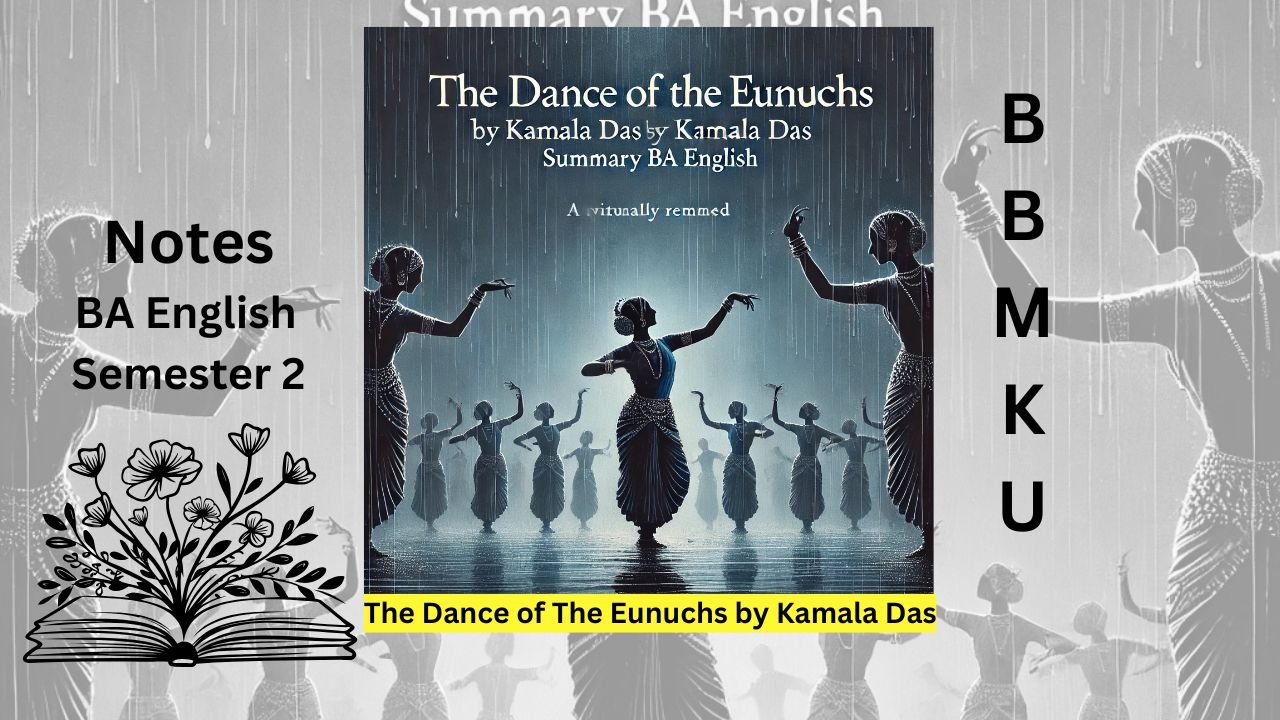The Dance of The Eunuchs: It is one of the masterpieces of Kamala Das’s poetry. This summary of this poem is for the BA English Honours student of the 2nd semester of BBMKU University. VBU university also follows the same semester. Let’s read the poem and understand the message of Kamala Das.
The Dance of The Eunuchs Summary
It was hot, so hot, before the eunuchs came To dance, wide skirts going round and round, cymbals Richly clashing, and anklets jingling, jingling Jingling... Beneath the fiery gulmohur, with Long braids flying, dark eyes flashing, they danced and They dance, oh, they danced till they bled... There were green Tattoos on their cheeks, jasmines in their hair, some Were dark and some were almost fair. Their voices Were harsh, their songs melancholy; they sang of Lovers dying and or children left unborn.... Some beat their drums; others beat their sorry breasts And wailed, and writhed in vacant ecstasy. They Were thin in limbs and dry; like half-burnt logs from Funeral pyres, a drought and a rottenness Were in each of them. Even the crows were so Silent on trees, and the children wide-eyed, still; All were watching these poor creatures' convulsions The sky crackled then, thunder came, and lightning And rain, a meagre rain that smelt of dust in Attics and the urine of lizards and mice..
Write a summary of the poem ‘The Dance of The Eunuchs’.
The Poem “The Dance of the Eunuchs” deals with the theme of unfulfilled love. Kamala Das is one of the most distinctive and original Indian poets writing in English. In this poem, she finds an objective correlative in the dance of the eunuchs to represent the suppressed desire within. In fact, the dance of the eunuchs is a dance of the sterile, and therefore, the unfulfilled and unquenchable love of the woman in the poetess.
The quest for love, or rather the failure to find emotional fulfillment through love, is the central theme of Kamala Das’ poetry. Her greatness lies in the fact that her love poetry is rooted in her own personal experiences. Her love poetry is unconventional and shocks the orthodox.
The dance of the eunuchs is a symbolic poem of Kamala’s inner feelings. It is said that the poem was written against the background of her sudden contact with a man who had hurt her when she was fourteen years old. This poem is very remarkable as it strikes the keynote of Kamala’s poetry as a whole. She is eminently successful in creating the atmosphere of summer heat.
It has many merits. It has not many excellent images which magnify the personality of the poetess. The following lines of the poem display the idea of the poet very clearly.
They sang of Lovers dying and or children left unborn….
by: Kamla Das
Some beat their drums; others beat their sorry breasts
And wailed, and writhed in vacant ecstasy.
The poetess sympathizes with the eunuchs who neither contribute to the male nor the female genre and suffer a peculiar irony of fate. The details of the weather contribute to building up the atmosphere of the poem. The hot weather is emphasized by the repetition of the word “hot” The image of “Gulmohar” is qualified by the epithet fiery” which gives additional charm to the poem. The word “Jingling”, was repeated thrice. It creates an auditory sensation of the music. The poet emphasizes the nasal sound since it contributes to creating a total impression of the eunuchs who are neither characterized by male power nor female delicacy. A Typical feminine gesture is also noticeable both in their voice and appearance. Quite in keeping with all these are the melancholic songs of “Lover’s dying” and “children left unborn”.
The “funeral” imagery in this poem is symbolic of the inner vacuity and sterility of the eunuchs as well as of their decrepit bodies. This image also creates the visual impression of the eunuchs who survive and suffer endlessly like “half burnt logs from funeral pyres”.
In short, this poem is an excellent example of a poem dealing with the theme of unfulfilled love. According to Srinivas Iyenger, “Kamla Das is a fiercely feminine sensibility that dares without inhibitions to articulate the hurts. It has received in an intensive, largely, nan-made world” She has been rightly called a poetess in the confessional mode. She is concerned with herself as a victim. Sexual humiliation becomes a central experience for her.
The use of words marks the rich sensibility of Kamla das. For her as for W.B. Yeats, “words alone are certain good”. She is fully aware of the immense potential of words. They grow on her “like leaves on a tree”. She uses varied and various kinds of words, images, and adjectives. They give the true picture of the poetess’ modes and feelings. She achieves a good harmony between, the idea and The words. All of this shows her mastery over the use of the English Language.

